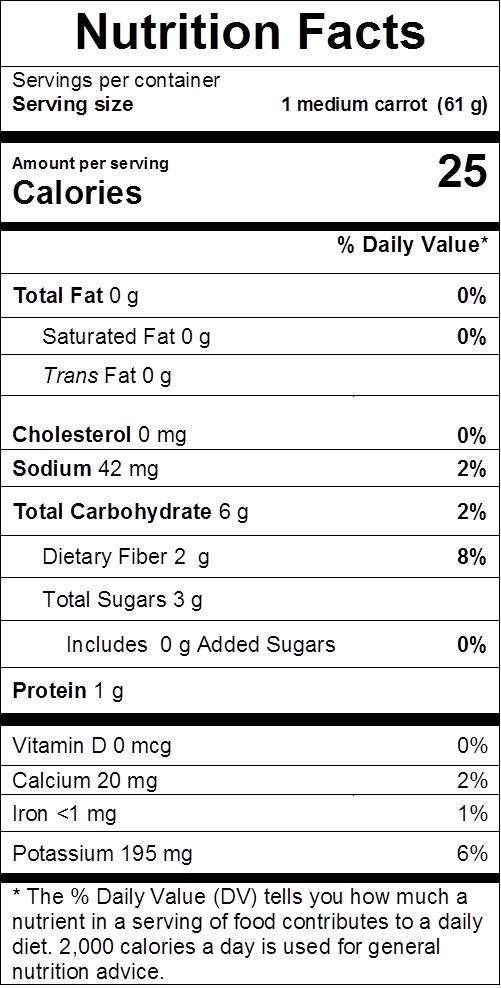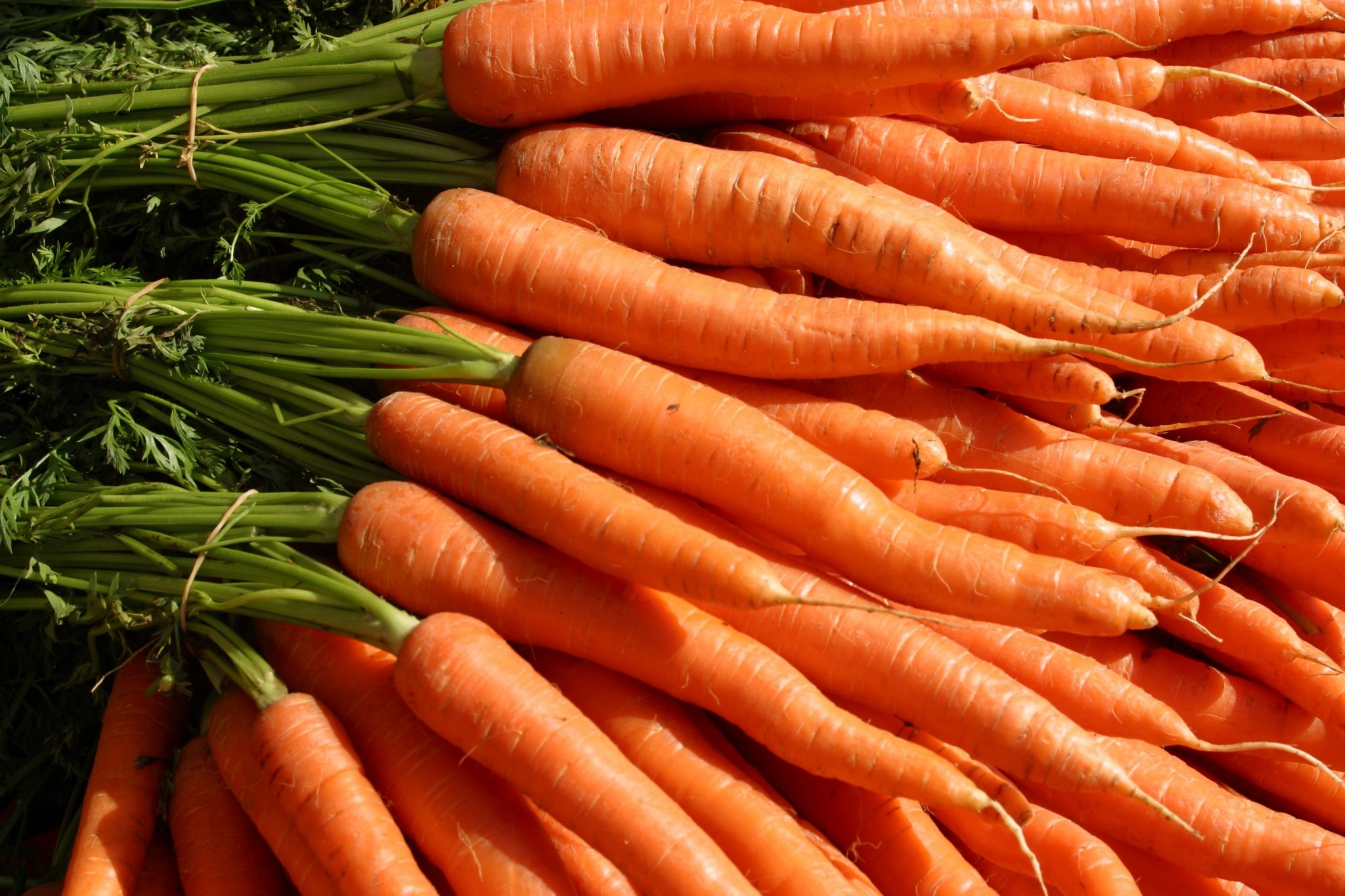The carrot is a widely used root vegetable around the world as one of the most popular food ingredients because of its high nutritional value, and its long shelf life. The oldest known ancestors of the carrot were first grown in Iran and Afghanistan. During its journey throughout the continents and centuries, many botanists attempted to improve the composition, look, taste and size of ancient carrots, and would produce the modern orange-colored carrot that appeared initially in 17th century Netherlands.
Carrots
Carrot seeds were brought and offered to surrounding Arabian, Asian and African lands, whom all accepted carrots instantly and started crossbreeding and producing new types of this well-known root. Even in ancient times, many different colors of carrots were grown; Red, white, green, yellow, orange, purple, & black.
The custom of medicinal carrot usage moved from Egypt to Greece and Rome in 1st centuries BC. There, hard and bitter to eat carrots were used as a recovery treatment for many illnesses and was especially utilized as a sexual aphrodisiac. When it comes to consuming in regular meals, Romans were understood to boil carrots and eat them with dressings and herbs. Carrot seeds reached Japan in the 13th century, then on to Brazil which was the very first South American nation to get carrots in the mid-17th century. The most telling indication of how popular carrots were in those ancient times come from Ancient Egypt, where many carrots were put in the burial places of dead Pharaohs, and the drawings of the carrot harvest and processing can be found in many hieroglyph paintings.
American homes were much slower to adopt the carrot, which is believed to have begun happening just after World War I when soldiers returning home brought stories and seeds of amazing French and other European food which considerably help them to make it through war years. The modern appeal of carrot and its presence in both sweet and tasty meals can be traced to World War 2 England, where the federal government actively encouraged house growing of carrots.
In 2012, China produced the majority of the world’s carrots, followed by Russia and the United States. For the previous ten years, California has grown 80-90% of the United States carrot crop. Other manufacturers consist of Michigan and Texas. California grows carrots primarily for the fresh market but has some processing acreage. Nearly 60% of California’s 2012 carrot crop was produced in Kern County, and 25% in Imperial County. Carrots are harvested year-round in California. They are typically harvested mechanically, other than for those sold with the tops on.
Carrots are loaded with vitamins, minerals, and other healthy plant compounds. It’s no wonder why they’re one of the most health-conscious foods you can eat. These are just some of the nutrients you’ll find in carrots:
Vitamin B6: One of the vitamins involved in helping the body turn food into energy
Vitamin A: Promotes great vision, and is very important for development, muscle advancement, and immune function
Biotin: One of the B-vitamins; plays an essential role in fat and protein metabolism, and the maintenance of hair and skin.
Vitamin K: Necessary for blood coagulation and can promote bone health
Potassium: An essential mineral for controlling high blood pressure and maintaining regular muscle movements
Lycopene: Antioxidant discovered in many red vegetables and fruits. It might decrease the risk of cancer and heart disease.
Polyacetylenes: This bioactive compound in carrots might fight against leukemia and cancer cells
Beta-carotene: Orange carrots are really high in beta-carotene, which is converted to Vitamin A in the body.
Alpha-carotene: An antioxidant that is also partially converted to vitamin A.
Lutein: One of the most common anti-oxidants in carrots, predominantly discovered in orange and yellow carrots and is necessary for eye health.
Your body will thank you for consuming this delicious, crunchy snack regularly. Here are a few of the things that carrots will do for your well-being:
Cancer: A range of dietary carotenoids have been shown to have anti-cancer results, due to their antioxidant power in minimizing free radicals in the body. Studies have found a possible link in between diets abundant in carotenoids and a lower risk of prostate cancer, however more evidence is had to validate whether the link is typical. Carrots include beta-carotene. Past research studies have concluded that beta-carotene supplementation may reduce the danger of lung cancer as well. Taking in more beta-carotene may reduce the danger of colon cancer, according to researchers in Japan. A 2011 study discovered that carrot juice extract could eliminate leukemia cells and stunt their growth.
Vision: Carrots consist of vitamin A. Vitamin A deficiency can cause xerophthalmia, a progressive eye illness that can harm typical vision and lead to night loss of sight, or the inability to see in low light or darkness. Vitamin A deficiency is unusual in the United States (U.S.), however eating carrots adds to vitamin A consumption and helps prevent a shortage. Carrots can help you see in the dark, sort of.

Diabetes control: The anti-oxidants and phytochemicals in carrots might help manage blood glucose.
Blood pressure: 1/2 cup of carrots consists of 1.8 grams (g) of fiber and 205 milligrams (mg) of potassium. Before the age of 50 years, guys need 38 g of fiber a day, and women need 25 g. After this age, women need 21 g daily, and men need 30 g.
Immune function: Carrots include vitamin C, an antioxidant. This helps improve the body’s immune system and avoid illness. Vitamin C can help reduce the intensity of a cold, and the length of time it lasts.
For magnificent carrot recipes, head over to shortnsweet.com

Western Veg-Produce, Inc.
PO Box 82217
Bakersfield, CA 93380
Office: 1-800-WVegPro (983-4776)
Fax: 1-661-637-2365
Sales: sales@wvegpro.com
Accounting: accounting@wvegpro.com


